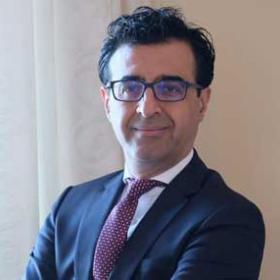
Hassan Discusses Kurds in Iraq and Syria at the European Parliament
In his address, Hassan notes that the Kurdish population, not only in Iraq and Syria, but also in Iran and Turkey, are by and large secular. Therefore, he says, they are indispensable long-term social partners in the wider war and generational struggle against jihadi Salafism.
The EWI Middle East and North Africa Director addressed the members of the European Parliament's Foreign Affairs Committee's Working Group on the Southern Neighborhood on April 19. Text below:
Mr. Chairman, esteemed members of the Foreign Affairs Committee's Working Group on the Southern Neighborhood, good afternoon. Thank you very much for this kind invitation; it is an honor to engage directly with you on an extremely relevant topic.
Due to decades of dictatorship and systematic destruction of civil society by ruling Baath regimes in Iraq and Syria, rise of radical Islam and ISIS as an alternative to authoritarian regimes, the failure of post-Saddam elites to produce a truly democratic and inclusive political order, today Iraq and Syria are sadly failed states. We can say with certainty that there is no way back to the pre-2003 Iraq and 2011 Syria state system.
Kurds are key military allies in the fight against ISIS. But they are not and shouldn't be seen as the ground force of the global coalition in the war against ISIS. I will get back to this point later on.
Iraqi Kurdistan faces a server economic crisis, hosts almost 1.8 million internally displaced persons (IDPs) and refugees from Iraq and Syria. Therefore it needs urgent economic support. The Kurdish population and Kurdistan Regional Government (KRG) should be admired and supported for hosting refugees and ensuring cultural, ethnic and religious coexistence in an age of sectarianism, rampant terrorism and violent extremism. While falling oil prices and disputes with Bagdad triggered the economic crisis, the root cause is politics and not economics.
The ruling parties in Iraqi Kurdistan, Kurdistan Democratic Party (KDP) and Patriotic Union of Kurdistan (PUK), along with other parties fought for decades for Kurdish self-rule. The Kurds do recognize and appreciate their sacrifices. Yet, lack of planning during the boom years of 2003-2013, mismanagement and corruption, exclusive reliance on oil and real estate at the expense of agriculture and manufacturing, transformed the once productive society into a consumerist one and made the region dependent on its neighbors for survival. More than 90 percent of the budget comes from oil. The region imports almost 70 percent or of goods from neighboring countries, especially Turkey, and 1.4 million people are on the payroll of KRG.
In Syrian Kurdistan (Rojava), the dominant political force Democratic Union Party (PYD) together with its non-Kurdish allies recently established a federation in Northern Syria. Given the disintegration of Syria and the decade's long repression of Kurds, this set up meets the demand of Kurds for greater self-rule. Despite its links to PKK, PYD is deeply rooted in the Kurdish population of northern Syria. It pursues a progressive policy on women, and it has involved non-Kurds and non-Muslims in its administration. But PYD needs to embrace and practice true pluralism.
To conclude my presentation, Kurds are among the most effective local forces in the fight against ISIS. But they are not and shouldn't be seen as the ground force of the global coalition in the war against ISIS.
Kurds are more than military allies. Kurdish Peshmerga and Shervanan (fighters) in Iraqi and Syrian Kurdistan respectively need urgent military and economic support for fighting ISIS. The Kurdish population, not only in Iraq and Syria, but also in Iran and Turkey, are by and large secular. Therefore they are indispensable long term social partners in the wider war and generational struggle against jihadi Salafism.
The European Union (EU) and the European Parliament (EP) should have long term partnership strategies with not only ruling and dominant Kurdish parties, but also with Kurdish civil society, independent voices, human rights and women's activists as well as emerging think tanks. The overall objective should be based on three interconnected strategic pillars: defeating ISIS, democratizing Kurdistan and supporting peaceful and legitimate Kurdish aspirations for greater self-rule that must embrace diversity, true pluralism, human rights, good governance and rule of law for Kurds and non-Kurds. This is not a moral obligation for EU but rather in the long term strategic interests of EU.
Thank you very much for your kind attention.

Hassan (right) speaks next to European Parliament Member Richard Howitt from the UK.

